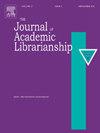“Domo arigato, Mr. Roboto”: A qualitative content analysis of AI music in WorldCat
IF 2.3
3区 管理学
Q2 INFORMATION SCIENCE & LIBRARY SCIENCE
引用次数: 0
Abstract
Artificial intelligence (AI) has been used for experimentation in generating music for the last seventy years, but recent advances in generative AI (genAI) have led to novel, creative, and even surprising results. Issues arise when genAI and human efforts are simultaneously recognized in a creative work, constituting the uncanny valley and leading to discomfort among listeners. Additionally, the lack of transparency required of media producers regarding genAI use robs audiences of their right to choose whether to engage or avoid genAI content. This has sparked discussions among researchers, industry leaders, and lawmakers about regulating genAI use with priority given to enforcing transparency. Libraries can play a role in this by curating metadata when cataloging genAI materials, but current cataloging practices and policies inhibit the cataloger's ability to maximize accuracy and transparency when describing genAI items. This study features a content analysis that examines WorldCat item records belonging to genAI songs and music albums and finds inconsistent item record descriptions, often vaguely referring to or omitting genAI use. Supported by epidata theory, this study recommends adopting Resource Description and Access (RDA) standards to improve accuracy and transparency in cataloging genAI music.
“Domo arigato, Mr. Roboto”:WorldCat中AI音乐的定性内容分析
在过去的70年里,人工智能(AI)一直被用于制作音乐的实验,但最近在生成人工智能(genAI)方面的进展带来了新颖、有创意、甚至令人惊讶的结果。当在创造性的作品中同时承认人工智能和人类的努力时,问题就出现了,这构成了恐怖谷,导致听众感到不舒服。此外,媒体制作人在基因使用方面缺乏透明度,这剥夺了观众选择是否参与或避免基因内容的权利。这引发了研究人员、行业领袖和立法者之间关于监管基因使用的讨论,优先考虑提高透明度。图书馆在编目基因材料时可以通过管理元数据发挥作用,但目前的编目实践和政策抑制了编目员在描述基因项目时最大限度地提高准确性和透明度的能力。本研究的特点是内容分析,该分析检查了属于genAI歌曲和音乐专辑的WorldCat条目记录,并发现不一致的条目记录描述,通常模糊地提及或省略了genAI的使用。在epidata理论的支持下,本研究建议采用资源描述与存取(Resource Description and Access, RDA)标准来提高基因音乐编目的准确性和透明度。
本文章由计算机程序翻译,如有差异,请以英文原文为准。
求助全文
约1分钟内获得全文
求助全文
来源期刊

Journal of Academic Librarianship
INFORMATION SCIENCE & LIBRARY SCIENCE-
CiteScore
5.30
自引率
15.40%
发文量
120
审稿时长
29 days
期刊介绍:
The Journal of Academic Librarianship, an international and refereed journal, publishes articles that focus on problems and issues germane to college and university libraries. JAL provides a forum for authors to present research findings and, where applicable, their practical applications and significance; analyze policies, practices, issues, and trends; speculate about the future of academic librarianship; present analytical bibliographic essays and philosophical treatises. JAL also brings to the attention of its readers information about hundreds of new and recently published books in library and information science, management, scholarly communication, and higher education. JAL, in addition, covers management and discipline-based software and information policy developments.
 求助内容:
求助内容: 应助结果提醒方式:
应助结果提醒方式:


